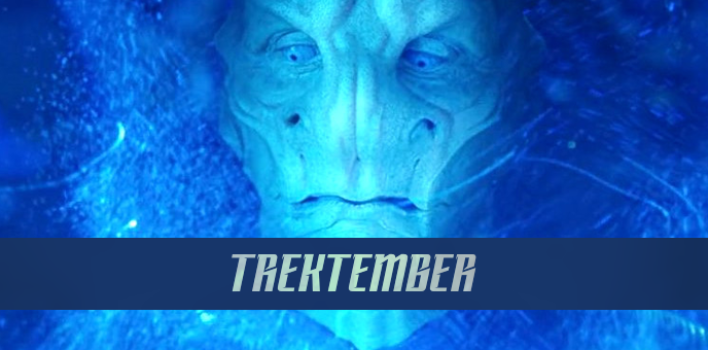Trektember: Si Vis Pacem, Para Bellum | Star Trek: Discovery
“We are born afraid, we Kelpiens. It’s how we survive. As such, my whole life, I have never known a moment without fear. The freedom of it…not one moment. Until Pahvo.”
—Saru
Sometimes it takes a monster’s mouth to express the most intimate human feelings. When Saru finished his musings on Kelpien fear, Burnham might as well have said, “you and me both, dude.”
Because we’re all born afraid.
If You Want Peace, Prepare For War
This episode’s Latin title is a profoundly sad phrase: If you want peace, prepare for war. In the Federation’s search for peace, Burnham, Tyler, and Saru come to the planet Pahvo in hopes of finding a way to detect cloaked Klingon warships. They’re surprised to encounter sentient life; tiny beings that unite the world’s flora and fauna into a harmonious whole. Though initially harmless and even helpful, their harmony and mental connection soon calm Saru’s inborn fear, convincing him to abandon the mission (as well as the Federation, and even his crew) in order to stay on the planet in peace and harmony. Reacting desperately to any attempt to sway or subvert him, Saru even goes so far as to attack Burnham while she completes their mission.
I enjoyed this episode (though not as much as “Magic to Make the Sanest Man Go Mad”). Delving deep into the Star Trek playbook it gives us a planetbound away team adventure, a classic Prime Directive/First Contact dilemma, and a mind alteration that turns out to be a deep expression of the subject’s subconscious. It even harkens back to episode 26 of The Original Series: “Errand of Mercy,” wherein Kirk and Spock are also restrained in their mission to defeat the Klingons by a peace-loving race who really thinks they should just talk it out. In the proud tradition of that episode, this one asks deep questions and proceeds to discuss, rather than answer, all of them.
But the greatest question the episode poses isn’t about peace, war, or preparations for either. It’s about harmony and fear.
Prey Experiences Peace
We’re all afraid. Like the Kelpiens, we’re born afraid; shunted from a place of warmth and comfort into a world full of painful things we don’t understand. Saru’s sad admission of lifelong fear applies to humans just as much as prey from a distant planet.
Fear really sucks. One of my family members experiences deep fear; and as much as they try to suppress it, it’s uncontrollable. “What is the next plan?” they’re always thinking. “What is the next enemy? Where will failure come from next?”
In this episode, a fearful creature experiences peace. Saru says it’s the first time in his life, and the way he gets there is a little bit surprising: he meets beings that “desperately want to know others and to be known.” They welcome him into their harmony, and he’s freed from his fear.
Note that he’s freed from his fear, not from the source of his fear. The Klingons are still a galactic threat. The predators on Saru’s planet are still present. Michael Burnham has still mutinied. Harry Mudd is still free in the galaxy. Every enemy that the Shenzhou and the Discovery have faced in the first half-season of this show is still a threat. Yet Saru experiences peace.
He hasn’t caused perfect peace in the galaxy; when “the scales fall from his eyes,” he’s in just as much danger as before. But now he’s part of a harmonious whole. The harmony of the Pahvans opposes and destroys his fear and satisfies his longings: “the only answers we require are here,” he tells Burnham and Tyler. And while it’s literal, melodious harmony on Pahvo, we see glimpses of that emotional harmony on Earth.
A lot of times we think we’ll be free from worries and fear if our fears are eliminated; if we no longer have to contend with their existence. But whether we know it or not, our fears are out there, ready to strike. “In this world, you will have trouble,” Jesus reminds us. But then He welcomes us into a harmonious relationship with His father.
The opposite of fear is not comfort…it’s harmony.
Fear and Harmony
“Fear not” is the most common, most radical commandment in the Bible. It confuses and befuddles those who hear it, and it confuses Burnham and Tyler when Saru tells them they have nothing to fear. With all these terrors in our lives, how could we possibly be free of fear? How could even harmony overcome fear?
The Pahvans will provide them with whatever they need, Saru says. The harmony he’s been shown gives a level of provision that means fear of need is no longer an issue. It doesn’t ignore his need, it fulfills it.
And Jesus’ reminder is similar: above, I quoted Him saying that we would have trouble, but that’s not the whole sentence. “In this world, you will have trouble,” he says,” but take heart: I have overcome the world.” (John 16:33, NIV) He doesn’t ignore our need, either; or our fears. Nor does He remove them. The promise He makes is that He is stronger than them, and that He welcomes us into His harmony, to know Him and to be known.
This may not be of comfort to you at this moment, and it may not end your struggles with fear forever. You may be wrestling with it until you meet Jesus – and, in fact, He expects that. In the end, “fear not” is the most common Biblical command because we need it the most and the most often – and because we see such a radical life change when we’re in harmony with the Savior who promises us that He will overcome it.
We don’t have to lie to our crewmates to get it. And we don’t have to protect it with desperation and violence. Jesus promises it to His people with no terms, no demands. He just welcomes us into His harmonious Kingdom.
• • •
Trektember is an annual series about Star Trek; this year, we’re examining the first seasons of Star Trek: Discovery and The Orville. For more information on this series, click here; or, to read every article from the beginning, click here!








Pingback: Trektember: Season 3 Episode List | Reel World Theology
Pingback: Trektember: Will You Take My Hand? | Star Trek: Discovery | Reel World Theology